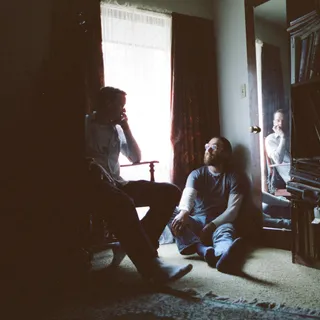A brief and incomplete list of places where you can expect to hear Small Talk by Whitney: Hotel lobbies. Hotel elevators. Your local CVS in 10 years. A restaurant that sells three tacos for $25 and serves them on a stainless steel zigzag. A Spotify mix titled “Chill Vibes Indie Road Trip” between a song by an AI-generated classic rock band and “Home” by Edward Sharpe and the Magnetic Zeros. Antidepressant commercials. Listen to these songs with your eyes closed and tell me you don’t see a formerly depressed woman slow-mo running through a meadow. Maybe that’s unfair—Whitney’s personality-free soft rock isn’t just a soundtrack for asking your doctor if this medication is right for you; it could just as easily sell orange juice or laundry detergent. Who says Whitney lacks range?
The Chicago indie rock band’s fifth record, Small Talk, is ostensibly a breakup album, but its sound is uniformly muted, lacking even post-heartbreak apathy. The lyrics deal with the dissolution of a relationship, almost always in the vaguest of terms. “I can’t talk without crying,” Julien Ehrlich croons, although other than his nasally delivery, nothing in his inexpressive voice suggests that this is true. You can’t fault Ehrlich for delivering his lyrics so noncommittally—he’s only meeting them where they’re at.
“Little peace of mind for a troubled soul/Ain’t prepared for a future unknown,” he falsettos on “Damage,” seeming like he’s trying to pull off an aimless drifter thing but really just sounding aimless. Schmaltzy strings and a Donnie Trumpet-ass horn section do little to remedy Ehrlich’s attitude (or lack thereof). “Tragic, the way I used to dwell/Through it all I hope you stay well,” he sings a few songs later. The resigned detachment of “Back to the Wind” comes off less like “Don’t Think Twice, It’s All Right” than was probably intended: It’s more like bad poetry posted by someone who really wants you to believe their recent breakup was mutual.
In its best moments, Small Talk is pleasant background noise. “In the Saddle” and “Evangeline” are pretty enough. The latter barely taps the potential of guest vocalist Madison Cunningham, levelling the playing field of the duet and leaving Cunningham’s normally dynamic voice sounding shallow and unmemorable. Opener “Silent Exchange” does Doobie Brothers by way of Grizzly Bear with a dash of dollar-store Bon Iver. It starts with almost-evocative lyrics, even if they’re delivered in such a stylised falsetto that they’re easily missed. This scene of a wedding guest who’s hiding heartbreak in public—“Write my name in a line of guests/A hair too drunk to be overdressed”—is about as dramatic as Small Talk gets lyrically. He’s too mild-mannered to even think about causing a scene.
The good news is that the songs don’t get worse from there. The bad news is that they stay almost the same. Each track sways into the next at a similar tempo and with similar intensity, which is to say none. On the goopy, mind-numbing waltz of a title track, Ehrlich sings about “fighters past their prime.” Is this a rare moment of self-awareness for a band whose output has gotten progressively slower, shinier, and more samey since 2016’s Light Upon the Lake? At this point, their songs are breezy to a fault. Small Talk is as unobjectionable as music can be, but to call it “inoffensive” would be spiritually false: I will be offended when I’m in a public place and one of these songs is foisted on me at the mercy of some vibes-forward algorithm—that is, if I can recognise what’s playing.
Follw Whitney on:
SPOTIFY




